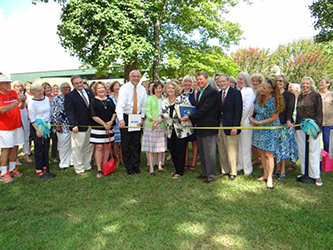Why Women’s History Month Matters
March 21, 2017
By Kathy Canzano, GFWC Women’s History and Resource Center Chairman
When Jane Cunningham Croly, the founder of GFWC, was denied entrance to a lecture featuring Charles Dickens in 1868, she decided to take matters into her own hands and form Sorosis. This led to the founding of GFWC on April 24, 1890, and since that day, women have come a long way. Thanks to the efforts of Jane Cunningham Croly, women are not only participating in society—they’re running a great deal of it as well. During Women’s History Month, we remember the accomplishments women have made throughout history. Without their sacrifices, women would not have the freedom and equality they enjoy today. There is still much work to be done, but Women’s History Month provides us with the platform needed to honor those who came before us and bring attention to the incredible things women can do.
Why do we need a whole month dedicated to women’s history? For a long time, as recently as the 1970s, women’s history was not discussed in schools. As National Woman’s Party Executive Director Page Harrington shared during this year’s Annual Women’s History Month Event at GFWC Headquarters, many people still lack basic knowledge about topics such as the women’s suffrage movement and the Equal Rights Amendment. This makes Women’s History Month more relevant than ever. We need to share information about this part of our history so that we can truly appreciate the struggles our foresisters went through to ensure we could do things like vote, apply for a mortgage, and run our own companies.
The origins of Women’s History Month goes back to the first International Women’s Day held in 1911, and Women’s History Week was first celebrated by the school district of Sonoma, California in 1978. From there, a 1979 conference about women’s history led to participants deciding to follow the actions of the Sonoma school district and begin celebrations of Women’s History Week in their own communities. In 1980, President Jimmy Carter designated March 2 through 8 as National Women’s History Week. His address encouraged schools to focus on the accomplishments of women such as Susan B. Anthony, Harriet Tubman, and Alice Paul, and we can still learn a great deal from this address today:
“From the first settlers who came to our shores, from the first American Indian families who befriended them, men and women have worked together to build this nation. Too often the women were unsung and sometimes their contributions went unnoticed. But the achievements, leadership, courage, strength and love of the women who built America was as vital as that of the men whose names we know so well.
As Dr. Gerda Lerner has noted, “Women’s History is Women’s Right.” – It is an essential and indispensable heritage from which we can draw pride, comfort, courage, and long-range vision.”
I ask my fellow Americans to recognize this heritage with appropriate activities during National Women’s History Week, March 2-8, 1980.
I urge libraries, schools, and community organizations to focus their observances on the leaders who struggled for equality – – Susan B. Anthony, Sojourner Truth, Lucy
Stone, Lucretia Mott, Elizabeth Cady Stanton, Harriet Tubman, and Alice Paul.
Understanding the true history of our country will help us to comprehend the need for full equality under the law for all our people.
This goal can be achieved by ratifying the 27th Amendment to the United States Constitution, which states that “Equality of Rights under the Law shall not be denied or abridged by the United States or by any state on account of sex.”
Fourteen states declared March as Women’s History Monty by 1986. In 1987, following years of joint Congressional resolutions proclaiming Women’s History Week and the urging of the National Women’s History Project, Congress declared March as Women’s History Month. Thirty years later, GFWC members continue to celebrate women’s accomplishments through the Women’s History and Resource Center. Our collections ensure that the story of women volunteers will continue to be told.
Mark this year’s Women’s History Month by educating yourself about the rich history of GFWC and the women’s suffrage movement. Visit https://www.gfwc.org/who-we-are/history-and-mission/ to learn about GFWC’s history. Expand upon your knowledge of women’s history by visiting the website of the National Woman’s Party, which offers a variety of resources about the suffrage era and the equal rights amendment: http://nationalwomansparty.org/learn/national-womans-party/.
Think about the children in your life. Do they know who Alice Paul is? What about Elizabeth Cady Stanton? Make it your goal to share knowledge about these incredible women with the people in your life. Women’s History Month is a celebration of women’s contributions to history, culture and society. In every one of these themes, I can see the works of the GFWC. It is important to recognize and celebrate the accomplishments of women, especially the hardworking women of GFWC. How will we be remembered?
Blog
Featured Member

Barbara Barnes
Growing up in Virginia, Barbara Barnes was always one to support her community, and when the opportunity to join GFWC presented itself, she knew it was the right step for her.
Success For Survivors Scholarship
Each year, GFWC awards scholarships to help intimate partner abuse survivors obtain a post-secondary education that offers a chance to reshape their future by securing employment and gaining personal independence.
Featured Club

Chapin Woman’s Club
The Chapin Woman’s Club has been an integral part of the Chapin, South Carolina community since 1971, and as a result has achieved great credibility in the area.


